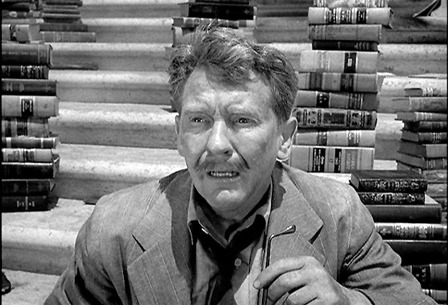It is perhaps the saddest ending to any Twilight Zone: Henry Bemis is without a place in the world, having just lost all hope at ever finding the peace he so greatly and intimately desires.
Bemis is, as most readers will doubtless know, an avid reader (indeed, "avid" hardly starts to describe it). His heaven as presented in the episode "Time Enough At Last" is one where all the trials and tribulations of the world disappear so that he simply might sit down and read morning, noon, and night--pausing, perhaps, to sleep on an old couch, puff on a bit of cigarette, and dine upon some canned food. Such pleasures are luxuries, for Henry Bemis lives after the nuclear apocalypse. He is, for all intents and purposes, the only person alive in the world. He is, for all intents and purposes, the only person who feels the way he does.
Let us rewind to the start of this episode which first aired in November, 1959. Bemis is a lowly bank clerk; yet even in his cage-like spot at the money-changing desk, he reads. When chastised by his boss for being this way, for having these innate habits which he cannot shake, an earlier mistake is referenced: the time that Bemis' look lingered too long upon a campaign button on a lady's blouse. The elegant prose of Rod Serling's teleplay communicates artfully the crass picture of Bemis being mistaken for staring longingly at a woman's bust. Such, it is made clear, was not his intention.
Later, the sympathetic, lovable Bemis goes home to his wife. Helen Bemis is a cruel, angry, hurtful, ugly shrew of a woman--just the sort of woman who inspires one to stay single. Or celibate. Adding insult to injury, she asks Henry to read some poetry to her. He is touched by the gesture--until he sees that she has marked out each and every page of his book of poems. Helen does not appreciate who this man is to the core. To say his marriage was one of live would be to speak a lie.
Thus I wonder if there can be a serious, academic look at "Time Enough At Last" as worthy of a homosexual reading. That Rod Serling has zero concrete clues to support this notion, unlike, say, the end of Some Like It Hot which then, as now, reads as farce-as-statement-of-truth:
If indeed the plight of Henry Bemis as a homosexual character is an argument to be made--particularly in light of recent battles and victories for equal rights--then the episode ends with a basic, elemental argument for equality. ""That's not fair. That's not fair at all. There was time now," cries Henry Bemis, now kept from the deeply driven desire to live as he would like.
The injustice of it all washes over him as the episode stops, soberly unwilling to conclude in the traditional sense. The episode ends, leaving the viewer hanging at that sense of injustice.
"That's not fair."

No comments:
Post a Comment